|
|
|
Sort Order |
|
|
|
Items / Page
|
|
|
|
|
|
|
| Srl | Item |
| 1 |
ID:
161465
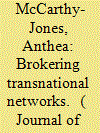

|
|
|
|
|
| Summary/Abstract |
The current explosion of cocaine, illicit methamphetamine and fentanyl in the Asia Pacific is the result of increased collaboration between Chinese and Latin American organized crime groups operating across the Pacific littoral. These networks are connected through brokers who operate as channels between these discrete criminal. Recently, elements of these networks in the Pacific have begun to appear in the Indian Ocean region, demonstrating the cumulative reach of these criminal organizations. Australian law enforcement and intelligence officials will need to focus intelligence gathering activities on identifying key brokers in order to disrupt these criminal networks. Specific attention should be paid to emergent networks in the Indian Ocean which could prove to be the missing piece of the puzzle to understanding the scope and depth of these linked criminal organizations that operate across all four corners of the globe.
|
|
|
|
|
|
|
|
|
|
|
|
|
|
|
|
| 2 |
ID:
184995
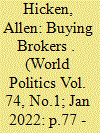

|
|
|
|
|
| Summary/Abstract |
Studies of electoral clientelism—the contingent exchange of material benefits for electoral support—frequently presume the presence of strong parties. Parties facilitate monitoring and enforcement of vote buying and allow brokers to identify core voters for turnout buying. Where money fuels campaigns but elections center around candidates, not parties, how do candidates pitch electoral handouts? The authors analyze candidates’ distribution of cash during an Indonesian election. Drawing upon varied data, including surveys of voters and brokers, candidates’ cash-distribution lists, and focus-group discussions, they find heavy spending but little evidence of vote buying or turnout buying. Instead, candidates buy brokers. With little loyalty or party brand to draw on, candidates seek to establish credibility with well-networked brokers, who then protect their turf with token payments for their own presumed bloc of voters. The authors find little evidence of monitoring of either voter or broker behavior, which is consistent with their argument that these payments are noncontingent.
|
|
|
|
|
|
|
|
|
|
|
|
|
|
|
|
| 3 |
ID:
163834
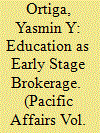

|
|
|
|
|
| Summary/Abstract |
Through an analysis of the field of hotel and restaurant management, a program popular among Filipino youth hoping to find work overseas, this paper argues that an integral, yet invisible, aspect of educating future migrant workers is “cooling out” working-class students for a hospitality industry that runs on low-wage, contractual labour. This practice of cooling out involves reorienting students’ ambitions towards blue-collar jobs that do not require college degrees, encouraging them to start from the bottom in pursuing their migration dreams. Based on qualitative interviews with 36 college educators and 25 students, this paper discusses how the cooling-out function serves as a form of migration brokerage, funnelling aspiring migrants into lower segments of the global labour market even before they leave their countries of origin. Yet, students do not question such practices, constructing a notion of working-class values that allows them to take pride in performing work that others might consider undesirable. This paper emphasizes the need for migration scholars to look beyond schooling as a stepping stone towards social mobility and unpack the role of higher education as part of a migration infrastructure that conditions aspiring migrants’ mobility.
|
|
|
|
|
|
|
|
|
|
|
|
|
|
|
|
| 4 |
ID:
167977
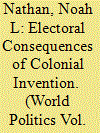

|
|
|
|
|
| Summary/Abstract |
This article studies the effects of traditional chiefs—a common type of broker—on voters’ ability to extract state resources from politicians. Using original data from Northern Ghana, the author shows that chieftaincy positions invented by colonial authorities are especially prone to capture, leaving voters worse off compared both to more accountable chiefs whose authority dates to the precolonial period and to voters who lack formal chiefs who can serve as brokers. The latter comparison exploits exogenous assignment of ethnic groups to the colonial invention of chieftaincy in the late nineteenth century. The findings suggest that whether voters benefit from brokers amidst clientelistic electoral competition depends on the accountability relationship between brokers and their clients.
|
|
|
|
|
|
|
|
|
|
|
|
|
|
|
|
| 5 |
ID:
110227
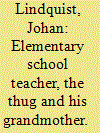

|
|
|
|
|
| Publication |
2012.
|
| Summary/Abstract |
This article considers the emergence of informal brokers in the context of an increasingly formalized regime of transnational labour migration from Indonesia. Following the 1997 Asian economic crisis and the fall of the Suharto regime, there has been a dramatic increase in documented transnational migration to Malaysia at the expense of undocumented migration. In this process, a growing number of private agencies have come to control the increasingly deregulated market for migrant recruitment. These agencies, in turn, depend on informal brokers who recruit migrants in villages across Indonesia to work on palm oil plantations and as domestic servants in countries such as Malaysia and Saudi Arabia. This article takes these informal brokers as a starting point for considering the current Indonesian migration regime, using ethnographic data from the island of Lombok. Along with offering a description of brokering practices, the article argues that the dual process of centralization of migration control and fragmentation of labour recruitment has created a space of mediation for individuals who can navigate bureaucratic process while embodying the ethical qualities that convince Indonesian villagers to become migrants.
|
|
|
|
|
|
|
|
|
|
|
|
|
|
|
|
| 6 |
ID:
110225
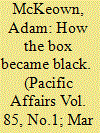

|
|
|
|
|
| Publication |
2012.
|
| Summary/Abstract |
Migration brokers and the organization of human mobility did not always exist in a black box. Before the early twentieth century, most attention from lawmakers, journalists and reformers actually focused on brokers and the infrastructure of human movement. By the late nineteenth century, however, three processes had begun to push migration brokers and infrastructure out of the limelight: 1) brokers and middlemen were increasingly demonized as the source of migration evils. This happened at a discursive level of depicting brokers as padrones, crimps, smugglers and, more generally, as the remnants of pre-modern culture that undermined the benefits of migration. Laws to regulate brokers also had the practical effect of pushing many brokerage activities underground, even as they created new opportunities for brokers to help migrants negotiate the new legal requirements. This demonization of brokers came hand in hand with 2) the emerging ideal of the "free" migrant as an atomized, self-motivated individual. Brokers were thought to interfere with the freedom that was believed to characterize a genuine migrant. Finally, 3) the new immigration laws of the early twentieth century focused on regulating entry at the border rather than the process of migration, and concentrated on the "free" individual migrant as the legitimate object of selection. The practical enforcement of these laws further made brokers invisible. Today, these combined factors continue to draw attention away from employers of migrants and broader structural processes and onto brokers as explanations for the inequities and exploitation surrounding migration.
|
|
|
|
|
|
|
|
|
|
|
|
|
|
|
|
| 7 |
ID:
143807
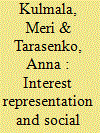

|
|
|
|
|
| Summary/Abstract |
The essay investigates how Russian veterans’ organisations represent the concerns of their constituency vis-à-vis the Russian state. An interest group approach is applied to investigate the ‘brokering’ function exercised by veterans’ organisations to lobby on behalf of their constituency. The analysis is based on the study of selected veterans’ organisations in Karelia and St Petersburg. The research finds that veterans’ organisations operate in a restricted environment, though our analysis shows that their agency has mattered, largely due to their political connections. The investigation reveals those mechanisms through which Russian veterans’ organisations act as brokers.
|
|
|
|
|
|
|
|
|
|
|
|
|
|
|
|
| 8 |
ID:
185891
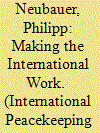

|
|
|
|
|
| Summary/Abstract |
Over the years, the police have become a central component of international peace- and statebuilding operations. However, predominantly trained and socialized as members of a domestic police service, police officers enter the global arena only – if ever – temporarily: their international deployment is often merely an interlude to their regular domestic police service. Pre-deployment training for international missions is therefore deemed vital for their success. When abroad, officers oftentimes find themselves carrying out work that has little resemblance to everyday police work back at home. By conceptualizing police training experts as “brokers”, the article helps to uncover the practices these brokers deploy to bridge the boundary between domestic policing and international missions. The research for this article was informed by practice theoretical considerations and ethnographically informed research strategies. It reveals that in several European countries, trainers’ brokerage is primarily practiced as a passing on of recent personal experience, by the creation of artificial borderlands that are meant to mimic the reality on the ground, and by diluting the boundary temporarily.
|
|
|
|
|
|
|
|
|
|
|
|
|
|
|
|
| 9 |
ID:
110224


|
|
|
|
|
| Publication |
2012.
|
| Summary/Abstract |
This special issue takes the migrant broker as a starting point for investigating contemporary regimes of transnational migration across Asia. The articles, which span large parts of Asia-including China, Indonesia, Laos, Malaysia, Singapore, South Korea, Thailand, Vietnam, as well as New Zealand-show that marriage migration, student migration and various forms of unskilled labour migration, including predominantly male plantation and construction work and female domestic, entertainment and sex work, are all mediated by brokers. Although much is known about why migrants leave home and what happens to them upon arrival, considerably less is known about the forms of infrastructure that condition their mobility. A focus on brokers is one productive way of opening this "black box" of migration research. The articles in this issue are thus not primarily concerned with the experiences of migrants or in mapping migrant networks per se, but rather in considering how mobility is made possible and organized by brokers, most notably in the process of recruitment and documentation. Drawing from this evidence, we argue that in contrast to the social network approach, a focus on the migrant broker offers a critical methodological vantage point from which to consider the shifting logic of contemporary migration across Asia. In particular, paying ethnographic attention to brokers illuminates the broader infrastructure that makes mobility possible while revealing that distinctions between state and market, between formal and informal, and between altruistic and profit-oriented networks are impossible to sustain in practice.
|
|
|
|
|
|
|
|
|
|
|
|
|
|
|
|
| 10 |
ID:
192012
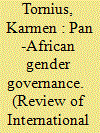

|
|
|
|
|
| Summary/Abstract |
The African Union (AU) has developed an elaborate gender governance architecture, including gender machineries and women’s desks, policy frameworks, path-breaking women’s rights laws, and ongoing campaigns on women’s rights–related issues. At the same time, the member states’ engagement with this architecture is at best lukewarm, with a lack of domestication, compliance, and accountability. This paradox is addressed in this article by developing the theoretical thinking around aspirational politics (Martha Finnemore and Michelle Jurkovich, ‘The politics of aspiration’, International Studies Quarterly, 64:4 [2020], pp. 759–69) and political brokers (Stacie E. Goddard, ‘Brokering change: Networks and entrepreneurs in international politics’, International Theory, 1:2 [2009], pp. 249–81), showing the social and relational origins of pan-African gender governance. In doing so, the article examines how ‘aspirational politics’ can be operationalized to examine the sociocultural and political production of shared future imaginaries. The paper focuses on AU femocrats as the key actors for AU’s aspirational gender agenda and argues for their importance as political brokers between AU member states, donors, UN agencies, and civil society organisations. By mobilizing actors and facilitating common ground and agreement, their institutionalized broker position allowed for various political entrepreneurs to emerge and thrive. At the same time, their pursuits are met with ‘aspirational fatigue’ or outright contestation by the member states. The case of the AU demonstrates how aspirational politics is not a ‘phase’ leading to norms governance but part and parcel of normative negotiation and engagement.
|
|
|
|
|
|
|
|
|
|
|
|
|
|
|
|
| 11 |
ID:
145091
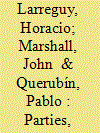

|
|
|
|
|
| Summary/Abstract |
Despite its prevalence, little is known about when parties buy turnout. We emphasize the problem of parties monitoring local brokers with incentives to shirk. Our model suggests that parties extract greater turnout buying effort from their brokers where they can better monitor broker performance and where favorable voters would not otherwise turn out. Exploiting exogenous variation in the number of polling stations—and thus electoral information about broker performance—in Mexican electoral precincts, we find that greater monitoring capacity increases turnout and votes for the National Action Party (PAN) and the Institutional Revolutionary Party (PRI). Consistent with our theoretical predictions, the effect of monitoring capacity on PRI votes varies nonlinearly with the distance of voters to the polling station: it first increases because rural voters—facing larger costs of voting—generally favor the PRI, before declining as the cost of incentivizing brokers increases. This nonlinearity is not present for the PAN, who stand to gain less from mobilizing rural voters.
|
|
|
|
|
|
|
|
|
|
|
|
|
|
|
|
| 12 |
ID:
175412
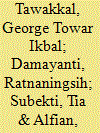

|
|
|
|
|
| Summary/Abstract |
This manuscript examines the role of intermediaries known as “brokers” in mobilizing voters, often by distributing cash and material goods, for campaigns in Indonesia. We build upon previous studies by examining the role of social networks in recruiting brokers into campaigns, the structure of brokerage networks, and the motivations of brokers to join a campaign. Whereas past studies tend to view the candidate-broker relationship in transactional terms, our study finds that the social network of candidates is also an important factor that helps explain how brokerage networks are structured and also the considerations that motivate brokers to work for a campaign. While material benefits and transactional considerations do motivate some brokers, we also find a wide variety of solidary benefits such as personal friendships and shared membership in social organizations as motivating factors for many other brokers. Our findings are based on in-depth interviews with approximately 150 individuals (candidates, brokers, citizens, etc.) during the 2017–2019 series of Indonesian elections which includes local village head elections, legislative elections, and the gubernatorial election.
|
|
|
|
|
|
|
|
|
|
|
|
|
|
|
|
| 13 |
ID:
157479
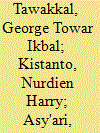

|
|
|
|
|
|
|
|